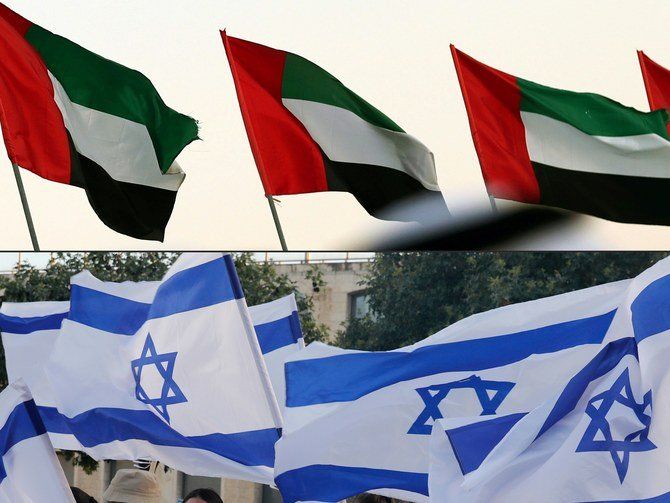World reacts to UAE and Israel move to normalize diplomatic ties

A few minutes every morning is all you need.
Stay up to date on the world's Headlines and Human Stories. It's fun, it's factual, it's fluff-free.
Israel and the United Arab Emirates (UAE) agreed on Thursday to a “full normalization of relations” in an historic deal brokered by United States President Donald Trump.
The deal, dubbed the “Abraham Accord," would allow the two countries to “chart a new path that will unlock the great potential in the region.”
Under the condition that Israel suspends its efforts to declare sovereignty over Palestinian-occupied lands in the West Bank, the deal would lead to bilateral cooperation on investment, tourism, security, energy and other areas of mutual benefit. Direct ties between the UAE and Israel would also open up, including the establishment of reciprocal embassies, allowing direct flights and delegating trade ambassadors.
After a three-way phone call with the Israeli and Emirati leaders, Trump told reporters at the Oval Office that “This deal is a significant step towards building a more peaceful, secure and prosperous Middle East.”
The accord makes the UAE only the third Arab country to have normal diplomatic relations with Israel, along with Egypt and Jordan.
“Now that the ice has been broken, I expect more Arab and Muslim countries will follow the United Arab Emirates’ lead,” Trump added.
Despite the landmark status of this development between the two nations, the move garnered mixed reactions both domestically and internationally.
Israel
In Israel, the move prompted angry reactions from right-wing Israeli settlers who supported the annexation of the Palestinian-occupied West Bank. Israeli Prime Minister Benjamin Netanyahu had previously promised to apply Israeli sovereignty to areas in the territory.
“He deceived us. He has deceived half a million residents of the area and hundreds of thousands of voters,” said David Elhayani, the head of the Yesha Council of settlers.
While announcing the agreement to the public, Netanyahu said in a televised address that the deal would pave the way to “full and formal” peace with the UAE and hopefully other Gulf Arab nations.
“It’s an incomparably exciting moment, a historic moment for peace in the Middle East,” he said.
However, he also declared that while he had agreed to delay the annexation of the West Bank, the plans remain “on the table” and that he would “never give up our rights to our land.”
“There is no change to my plan to extend sovereignty, our sovereignty in Judea and Samaria, in full coordination with the United States,” stated Netanyahu, using the West Bank’s original Biblical name.
Palestine
Meanwhile, outrage spread amongst Palestinian leaders, with President Mahmoud Abbas calling the agreement a “betrayal of Jerusalem, Al-Aqsa [mosque, Islam’s third-holiest shrine] and the Palestinian cause.”
Prior to the announcement of the deal, the Palestinian leaders apparently had no knowledge of the alliance and were effectively “blindsided.”
An executive member of the Palestine Liberation Organization said that the announcement of the Israel-UAE deal was akin to being “sold out by your “friends”.”
A spokesperson for well-known Palestinian Sunni-Islamic militant organization Hamas said that despite the Israeli agreement to suspend its plans for annexation, it did not serve the cause of Palestinians.
“This agreement does absolutely not serve the Palestinian cause, it rather serves the Zionist narrative. This agreement encourages the occupation [by Israel] to continue its denial of the rights of our Palestinian people, and even to continue its crimes against our people,” said spokesman Hazem Qassem.
“What is required is to support the legitimate struggle of our people against the occupation and not to establish agreements with this occupier, and any annexation we will face by a Palestinian confrontation that is supported by the Arabs and internationally, and not by signing normalization agreements with them [Israel].”
The US
While Trump has come under scrutiny at home for his handling of the coronavirus pandemic and the accompanying economic collapse, this appears a big win in terms of foreign policy achievements ahead of the upcoming presidential elections.
As the effective middleman of this deal, Trump received credit from onlookers as well as the two nations involved, with Abu Dhabi’s Crown Prince Sheikh Mohammed bin Zayed Al Nahyan thanking the US president for this pragmatic and unique approach that led to the agreement.
Other countries
Representatives of Egypt and Jordan, the two Middle Eastern states which already have established relations with Israel, praised the move.
“I followed with interest and appreciation the joint statement between the United States, United Arab Emirates and Israel to halt the Israeli annexation of Palestinian lands and taking steps to bring peace in the Middle East,” tweeted Egyptian President Abdel Fattah el-Sisi.
The peace agreement also received praise from the United Nations, which expressed hopes that the normalization of bilateral ties between the two countries could help kick-start a two-state solution with the Palestinians.
“The secretary-general welcomes this agreement, hoping it will create an opportunity for Israel and Palestinian leaders to reengage in meaningful negotiations that will realize a two-state solution in line with relevant UN resolutions, international law and bilateral agreements,” said a spokesman for UN Secretary General António Guterres.
“The secretary-general will continue to work with all sides to open further possibilities for dialogue, peace and stability,” added the spokesperson.
Have a tip or story? Get in touch with our reporters at tips@themilsource.com




Comments ()